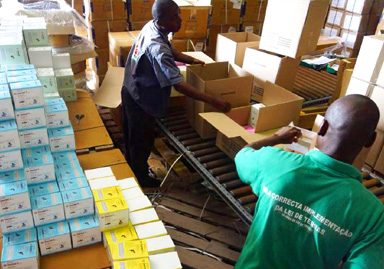In Mozambique, Using Incentives to Strengthen Health Supply Chains
Categories: Announcements

Packaging of malaria commodities to be distributed to health centers and community health workers. Adil warehouse in Matola, Mozambique, October 2012. Photo Credit: Arturo Sanabria.
To work well, health supply chains require timeliness, accuracy, and reliability at all stages. Even one break in the supply chain—an hours’ delay in delivery—”can have repercussions throughout the system, ultimately determining if families can access life-saving medicines and commodities.” Thus it is crucial that all actors—from procurement specialists to storekeepers and service providers—do their part to keep the system running.
A new HFG report, Use of Incentives in Health Supply Chains: A Review of Results-Based Financing in Mozambique’s Central Medical Store, reviews the progress of a results-based financing (RBF) program in Mozambique aimed at strengthening the performance of the Central Medical Store. This report “explores the effects of introducing performance incentives at the central level of the supply chain,” highlighting successes and the enabling factors, and offering recommendations for improvements.



